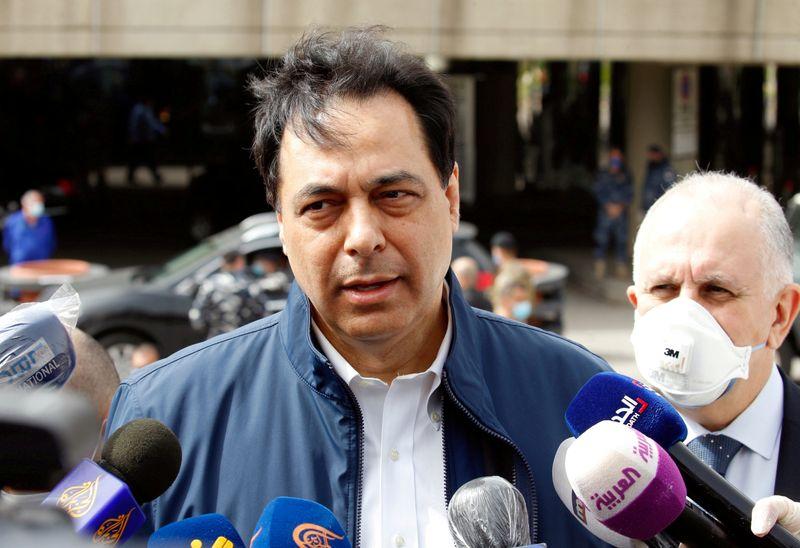Lebanese judge charges PM, ex-ministers over Beirut port blast

BEIRUT (Reuters) – The judge investigating the Beirut port explosion has charged Lebanon’s caretaker Prime Minister Hassan Diab and three former ministers with negligence over the blast that killed 200 people and devastated swathes of the capital.
FILE PHOTO: Lebanese Prime Minister Hassan Diab speaks to the media outside Beirut’s international airport, Lebanon April 5, 2020. REUTERS/Mohamed Azakir//File Photo
Diab, whose cabinet resigned over the August blast after taking office in early 2020, said his conscience was clear and accused the judge of breaching the constitution.
Four months after one of the largest non-nuclear explosions on record, which injured thousands of people, victims are still awaiting the result of the investigation. Lebanese leaders had promised it would come within days.
The explosion added to the challenges facing Lebanon, where decades of waste and corruption have triggered the country’s worst ever financial crisis.
Lebanon’s sectarian leaders are still haggling over who will be in the new cabinet.
Judge Fadi Sawan called Diab and former finance minister Ali Hassan Khalil in for questioning next week, along with former public works ministers Ghazi Zeaiter and Youssef Finianos, state news agency NNA said on Thursday.
DIVIDED OPINION
Zeaiter, who said he would comment once he was officially informed, headed the public works ministry in 2014, soon after the Rhosus ship carrying tonnes of ammonium nitrate arrived at Beirut port.
The highly explosive chemicals were stored for years in poor conditions at the port, which lies in the heart of the capital.
There was no immediate comment from Finianos.
Khalil, a top aide to Lebanon’s influential Parliament Speaker Nabih Berri, said he had no role in the case as former head of the finance ministry, which oversees customs.
Slideshow ( 2 images )
He said on Twitter that he was surprised by the judge’s allegations which “violated the constitution and the law”.
Families of some of the victims say Judge Sawan told them he had sent Berri a memo calling for immunity to be lifted from several former ministers and premiers, but the speaker had not accepted his proposal.
The judicial council that appointed Sawan said on Thursday he sent a letter last month telling parliament his investigation had revealed “serious suspicions” linked to some government officials. Parliament replied it found no such suspicions based on the information provided, the council said.
Sawan decided to interrogate a number of officials “as defendants”, including ministers, and was doing his job to find the culprits, it said.
A parliamentary office statement in November said that when asked about the letter, parliament speaker Berri said: “We have done what needs to be done and replied to him”.
The probe has sparked legal debate in Lebanon about whether ministers enjoy immunity in this case.
Thursday’s move showed Sawan sided with those saying immunity does not apply, said Nizar Saghieh, head of The Legal Agenda, a research and advocacy organisation.
“This is a positive thing, meaning it has opened the door to bringing the ministers to account.”
A senior judicial source said it was up to a special court, which includes seven lawmakers and eight judges, to indict the ministers rather than Sawan.
Several officials have been detained since the blast, including the port and customs chiefs, with dozens testifying as witnesses, including Diab.
But many Lebanese remain sceptical that senior politicians will be held to account, fearing the truth will never emerge from a system riven by corruption.
Security officials had warned Diab and President Michel Aoun the nitrate could destroy the capital if it exploded, according to documents seen by Reuters and senior security sources.
Aoun has said he had no direct authority over the port.






